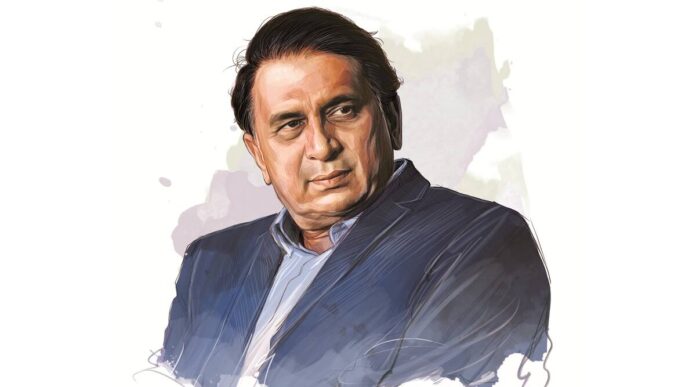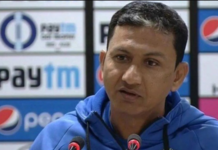In this Idea Exchange, one of Indian cricket’s finest exponents, Sunil Gavaskar, speaks of the confidence that has powered his career on and off the field, the need for accountability of captains and coaches and why the 1983 World Cup win was a milestone. The session was moderated by Sriram Veera, Deputy Associate Editor.
Devendra Pandey: There are two stars in India whose mass appeal hasn’t changed through generations: You and Amitabh Bachchan. What is your mantra to be active, updated and relevant? Would you like to continue like Richie Benaud or does the thought of quitting commentary come sometimes?
रोहतक से छात्रा व महिला लापता: बस अड्डे पर स्कूल बस छोड़कर गई छात्रा गायब, दो बच्चों की मां लापता
The important thing is to enjoy what you are doing. I tell new people joining commentary to speak what they feel about the game as that is important. But, don’t take yourselves seriously. The moment you feel your opinion matters, when things don’t go according to what your opinion is, it starts to make you negative. I don’t take myself seriously at all. The number of times you might have heard me crack a joke at myself, that’s because I just go out there to enjoy myself.
I think I’ve been fortunate in the sense that I don’t do commentary other than what involves India. Or the World Cup. It’s not like a 12-months-a-year thing. And because I enjoy it, there hasn’t been an issue at all. You mentioned Richie Benaud, who’s a role model on how it’s important to let the picture speak rather than you. When Graham Gooch got a triple hundred, it was my first Test as a commentator. Richie and I were doing commentary. As soon as Goochie got it, Richie said, ‘That’s his triple hundred’ and he put his mic down. I picked up my mic and he just signalled to me to not say anything. After about 10 seconds, he signalled for me to speak. Then he told me, ‘Let the viewer savour the applause and everything coming through on the picture rather than you speaking on it at that stage.’ I think that was incredible.
I expected more from Rohit Sharma. I expected India to do a lot better. In India, it is a different thing, but when you do well overseas, that is really the test. That is where I think he has been a little disappointing
The other one who comes to mind is Amitabh Bachchan. He’s an inspiration. Look at what he’s doing at his age. He’s maybe five-six years older than me. He’s still working every day.
Sandeep Dwivedi: People talk about the confidence and aggression of the present team. But you did it without a helmet, IPL power. The Board wasn’t as financially powerful as it is now. You always had that conviction, confidence and we have never seen you overawed anywhere.
It was probably the way my parents brought me up: be confident if you’re doing the right thing, not be apologetic about it. I know that on some occasions, I might have overstepped. But even when we were playing, it was always about trying to do something for teammates.
When we first formed the Cricketers Association in the West Indies in 1976, I was the secretary. The Board was in full strength and (Srinivasaraghavan) Venkataraghavan and I were the two representatives. Any other day, it would have been quite scary with the array of all the biggies, former presidents of the Board etc. But we said, ‘Look, we are not a trade union. We are not trying to do anything which is going to go against Indian cricket. All we’re saying is these are things that we, as players, can do to enhance our performances and do much better for our country.’ I think they relaxed after that. They realised it wasn’t going to be a rebellion of sorts. After that, we didn’t have any issues. If there was anything we wanted to get done, Venky would speak to Mr (S) Sriraman or Mr MA Chidambaram. I would speak to Mr (SK) Wankhede or Mr. RP Mehra, who was the BCCI president then and who I got along very well with.
The truth is that the main guys do not want to go early because they know that come what may, they will get selected… You call yourself the fittest team in the world… how do you break down so soon?
Sandeep Dwivedi: We hear tales of how you would take care of every little detail while you prepared for a game. It’s said that you would read books that had bigger fonts since the one’s with smaller print would strain your eyes.
My uncle Madhav Mantri played for India and would tell us stories about how Vijay Hazare would not go and see a movie because the moving pictures were harmful to the eyes. That particular thing told me how eyes were important — as an opening batsman seeing the line and length from the release point of the bowler was such a crucial aspect. So, I took care of my eyes to a great extent. In case the font of a book was not too big, even if it was a bestseller, I would not read it. When I went out to bat in the day light, I didn’t like photographers using flash. I wasn’t an expert in photography but I used to wonder why you need flash in the day. Today, everybody looks up at the sun. Our coaches told us never to do that as you’d be blinded by the sun. I would skip before going out to bat to get the circulation in the legs going before the first ball. These little things you do to see that your first ball was not your last one.
Sriram Veera: You are around at Test venues. In the last 5 or 10 years has any Indian batsman sought your help with their batting?
Rahul Dravid, Sachin Tendulkar, VVS Laxman regularly came to me. They would approach me with a specific problem and you could tell them something which you had observed. In recent times, the only time I took the initiative was when we were in the same hotel as the Indian team and Mayank Agarwal was just passing by for breakfast. I remember telling him maybe he should shorten his backlift. It was because of backlift, he would edge balls even while defending. I don’t have an ego about this, I could go and talk to them but since there are two coaches — Rahul Dravid and Vikram Rathore — sometimes you hold back since you don’t want to confuse them with too much information.
Sriram Veera: Quite a few of the batting problems are not getting solved. What do you have to say about batting coach Rathore? Shouldn’t there be accountability for a coach?
If the batters are making the same mistakes over and over again, you need to ask what has happened with your technique? How have you tried to improve the batter? Have you tried to tell him, maybe take a different guard? Don’t take a leg-stump guard, take a middle and off stump guard.
I remember once calling Virender Sehwag out of the blue. He had not been scoring too many runs. I told him, ‘Viru, just try the off-stump guard’. So he asked, ‘Why, Sunny bhai?’. I told him, ‘Look, you aren’t known for great footwork. What is happening is, sometimes when you are getting out, you are reaching out for the delivery and it makes things difficult for you. Maybe if you take the off-stump guard, you straight away know that the ball is outside the off-stump’. After that in the next game, he got runs. These are the things that you can tell as a coach. But, in the end, the pressure on the batter is completely different.
Sriram Veera: Dravid was seen as a coach with a long-term vision. It hasn’t happened as yet — reading pitches, team combinations, on-field tactics. What is it that you’d want him to do?
The selectors and the Board should be asking questions: ‘Why did you field first (at the World Test Championship final)? It was explained at the toss that it was overcast. The question after that should be, did you not know about Travis Head’s weakness against the short ball? Why was the bouncer employed only when he had scored 80 runs? You know, the moment Head came into the bat, in the commentary box, we had Ricky Ponting saying, ‘Bounce him, bounce him.’ Everyone knew about it but we didn’t try. This is where the selection committee should be calling both captain and coach and asking, ‘Hello, what happened?’ Whether you win or lose, the captain knows that he is going to be there. This has not been a recent case, mind you. This has been happening since 2011. There have been results where we have been wiped out in the series 0-4, but the captain hasn’t changed.
ट्विटर चुनिंदा कंटेंट क्रिएटर्स को विज्ञापन राजस्व हिस्सेदारी की पेशकश करेगा, विवरण अंदर –
Sriram Veera: How do you assess Rohit Sharma’s captaincy? Did you expect more from him?
I expected more from him. I expected India to do a lot better than they have. In India, it is a different thing, but when you do well overseas, that is really the test. That is where I think he has been a little disappointing. Even in the T20 format, with all the experience of the IPL, hundreds of matches as captain, with a mix of some of the best players in the IPL, not being able to get to the finals has been disappointing.
Rahul Pandey: After the WTC final, Rohit Sharma said ideally we would need 20 to 25 days to prepare for this sort of fixture. Do you think it will be ideal for Indian players to get done early with the IPL and leave?
What kind of preparation are we talking about? Now they have gone to the West Indies. You have the example of the World Test Championship before you. Are you playing any matches? So, what is this talk about 20-25 days? The team that the West Indies is today, you can go one day before the Test match and still beat them. But that should not blind us to the fact that when you talk about preparation, be genuine about it. Go 15 days before, play two warm-up matches. The main guys can rest, but the guys in the reserve, the fringe players, might be actually challenging some of the guys who are not doing well. He does not get an opportunity to show that he is good enough.
The truth is the main guys do not want to go early because they know that come what may, they will get selected. When you go early they will talk about the workload. You call yourself the fittest team in the world or fitter than the earlier generations, then how do you break down so soon? How do you have a workload issue when you play a 20-overs game?
Pratyush Raj: When you see the current pacers breaking down so regularly, how good was Kapil Dev and why was he so unique?
Because he just bowled and bowled in the nets. I don’t recall him going to the gym at all. He did laps of the ground, bowled to five and six top-order batters in the nets and he would go and bat. And he would again roll his arm over.
I have been told by an assistant coach of one of the IPL teams, that the biomechanics guy has specifically said that these bowlers will not bowl more than 20 deliveries. This bowling coach asked, ‘In an IPL match, they need to bowl 24 deliveries, so why only 20 deliveries in the nets?’ The reply was, ‘No, their body should not take more of the load, they are playing so much cricket.’ This is where I think a lot of the breaking down happens. If you end up bowling more in the match (than nets), you will pull up your muscles.
Sriram Veera: The Indian Express had done an interview with R Ashwin, where he had said that ‘Earlier, team mates used to be friends, now we are just colleagues’. Do you think this is the saddest thing you would have heard in recent times as a former player?
Yes, it is a sad thing because you should be able to get together after the play ends and maybe not talk about the game but about music, films, about your interest in space. But if that’s not what is happening, it is disappointing. Having said that, the new thing that started 20 years ago or longer is that every player gets a single room. That, too, can be a factor. When we played, we shared rooms. Obviously you get to know your roommates quite well. A lot of friendships developed there. And if your roommate was friends with another one, you got together in one room. So, you had four-five people getting together in a room.
Sriram Veera: Not that it helped you! Your flatmate at Somerset, Joel Garner, didn’t bowl a single easy ball at you in the (1983) World Cup final.
You know what he told me? Everything was going past my face in the first over and then the same thing happened on the first two deliveries of the second. Then he bowled a ball on the pads which I tried to flick. It touched my pads and went down to fine leg for a leg bye. I got to the non-striker’s end and said, ‘Hey Bird, how about one to go off the mark for your old flatmate?’ He looks down at me, 6’8” tall, and says, ‘No man, this is a World Cup final, no freebies for you’.
Sandeep Dwivedi: This thing about lesser teams, you remember that old phrase which you don’t often use these days — ‘popatwadi’ team? Was there actually such a team in Bombay?
I think there was a popatwadi team which Dilip Sardesai knew about. This was Sardesai’s term really. There was another term he used: ‘Ye chakku hai.’ There used to be a tennis player Chuck McKinley, who won Wimbledon (1963) and any player who was a bit of a show-off, he would use the term ‘chakku’. That is Bombaiyya slang ‘Arey, chakku hai, yaar!’ Chakku and popatwadi were two common words back then.
Anil Dias: What do you make of West Indies not making it to the World Cup and what are the steps they need to take to get out of this slump?
It is where I went for my first tour and I know a lot of people there. I know the kind of legacy those wonderful cricketers left behind. There’s a pretty laidback temperament which is fantastic but when it comes to playing, sometimes a laidback temperament might not get you results. To Clive Lloyds, Malcolm Marshalls, Viv Richards, Andy Roberts, Michael Holdings, Garner — the wonderful era for West Indies Test cricket — every Test match that they played was extra income. Today, the West Indian players, whether it is Test player or T20 player, all players all over the world, are guaranteed by their central contracts, a hundred thousand dollars or whatever. But if you know the West Indian temperament and you have that much in the bank before you score a run or take a wicket, I am not too sure to a lot of them if it actually matters whether they score runs or not. My suggestion would be to increase the Test match fees but don’t give them central contracts. You are paid for your performance. Then, probably, they will have a different attitude.
Tushar Bhaduri: With T20 leagues mushrooming, will Test cricket be confined to four to five teams only?
There is a great possibility of that happening. In the future, a team like New Zealand may play Test cricket overseas but might not play that much at home. That is because they might not get crowd support and they wouldn’t get people tuning in to watch the game. Currently, there are 12 teams playing Test cricket but going ahead, Afghanistan, Ireland and Zimbabwe, I believe, may be interested in playing only white-ball cricket.
Nishant Shekhar: A few days ago, Andy Roberts made a statement that the 1983 victory was a lucky win for India. How do you react to that remark?
Look at that! No impressive player in the team, yet we won. When you look back at the wins West Indies had — in 1975 you could say that Australia were as good as them — but after that they (West Indies) were the dominant team. So, you could say that beating teams less dominant than you… what is the big deal? When we won the World Cup, we actually beat the best team in the world. A lesser team like India beat a better team like West Indies. So our win is a better win than their two wins
.
माइक्रोसॉफ्ट ने एक्टिविज़न के USD 69B बायआउट मामले में FTC के अनुरोध को अस्वीकार करने की अपील की –








